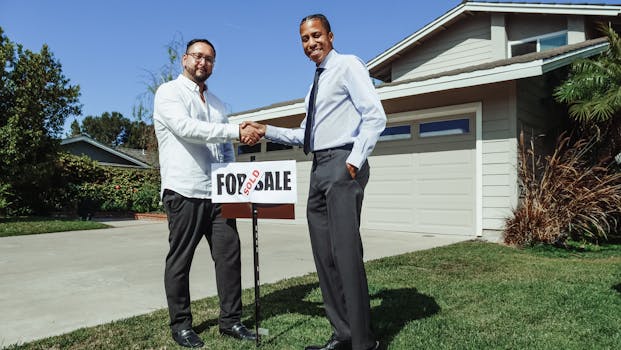Introduction
The decision to rent or buy a home is a choice that many people in the United States face. It's a question of weighing the benefits and drawbacks that each option offers and deciding which is more suited to one's lifestyle and financial situation. The process can be daunting and filled with uncertainty, especially for those who are new to the real estate market. When considering homeownership, many important factors come into play. For example, homeowners not only need to have a down payment saved up, but they also have to consider closing costs and other associated expenses. Buying a home requires a significant initial investment, and for many people, it simply isn't feasible. On the other hand, renting allows people to sidestep the financial burden of buying a home. Generally, renters pay lower upfront costs compared to homeowners, and the monthly rental payments are usually less than mortgage payments. This financial freedom can be especially important for those who are looking to invest their money elsewhere, such as in a startup or a new business venture. Renting also offers enhanced flexibility and mobility. Renters can easily move from one location to another, whether they have a new job, are looking for a change in scenery, or simply want a different living arrangement. For those who are unsure of where they'll be living in the next few years, renting can be an appealing option. Furthermore, renting tends to produce fewer responsibilities for the tenant. The landlord is responsible for managing the property, maintaining it, and responding to any necessary repairs. As a renter, one can enjoy a more stress-free lifestyle without the weight of homeownership obligations. Finally, renting can be a safer choice for those who are not financially secure. Homeowners are responsible for paying property taxes and mortgage payments, regardless of any fluctuations in the housing market. Renters, however, are usually less affected by such changes and can more easily adapt their finances to suit their situation. In essence, deciding whether to rent or buy a home is a personal decision that requires careful consideration of individual factors. In the following sections, we will delve deeper into the advantages of renting and explore the drawbacks of homeownership. By the end of this blog post, we hope to provide our readers with the information they need to make an informed decision about their housing.

Lower Upfront Costs
Buying a home can be a significant life purchase that impacts one's financial stability. While owning a home may provide a sense of stability and security, it can also be a hefty financial burden. One of the main deterrents of buying a home is the upfront cost, which includes the down payment, closing costs, and other related costs. The financial commitment required to purchase a home can be daunting, leaving many individuals feeling as though they are not ready. In contrast, renting is a more affordable option for those without a large savings or financial stability. Most landlords require a security deposit equivalent to one or two months' rent, which is significantly less than the down payment required when purchasing a home. Renting offers the flexibility of being able to allocate resources towards other investments or financial obligations. When you own a home, your money is tied up in the property, which means you are unable to invest it elsewhere or use it for other financial goals. Renting allows renters to invest their money towards other investments, such as education or retirement. When you rent, you don't have to worry about property taxes, which can be a significant expense for homeowners. Property taxes can also fluctuate, which means homeowners have to be prepared to pay more if taxes increase. Additionally, homeowners bear the burden of paying for unforeseen repairs or maintenance costs associated with the property. These costs can add up quickly, leaving homeowners with unexpected financial responsibility. Renting also provides flexibility when it comes to lifestyle and living situations. Renters are not tied down to a specific location and can move more frequently than homeowners. For those who have jobs that require travel, renting may be a more suitable option since it provides the ability to relocate quickly without the hassle of selling a property. Renting is also a more suitable option for those who are not sure where they want to settle or who are planning on moving in the near future. In conclusion, renting may be a more suitable financial option for those who are not financially secure and who want to allocate resources elsewhere. It can also provide more flexibility and mobility than owning a home, making it a great option for those who have jobs that require relocation. Renting also eliminates some of the financial and maintenance-related responsibilities that come with owning a property. One of the main advantages of renting over homeownership is the lower upfront cost, which is a major consideration when it comes to personal finances.

Flexibility and Mobility
When it comes to the decision of renting vs. buying a home, one key factor that should be taken into consideration is flexibility and mobility. Renting offers a level of flexibility that buying a home simply does not. First and foremost, renting offers the ability to move around more frequently. For those who value the freedom to move and explore new opportunities, renting could be the better option. This is especially true for young professionals who are just starting out in their careers and may not yet have a clear idea of where they want to settle down. With renting, it's much easier to move to a new city or state without having to worry about the complications of selling a house. Additionally, renting can be more suitable for temporary living arrangements. For those who know they will only be in a certain city or area for a short period of time, renting may be a better option than purchasing a home. This could be the case for college students, those on temporary work assignments, or even those who are just starting a new job in a new city and want to take some time to explore before settling down. Renting also offers less of a commitment than buying a home. When purchasing a home, there are many factors to consider, such as the stability of the job, proximity to family, and long-term financial goals. Renting, on the other hand, offers the ability to move around more frequently and doesn't require a long-term commitment. With renting, renters have more freedom to change their mind if their plans change or if they simply want to try out a new location. Finally, renting can allow for a level of convenience and flexibility that homeownership simply does not. For example, renters can choose to live in a location that is closer to work, family, or friends. Additionally, renters do not have to worry about the added responsibility of maintaining a property or making repairs when things break down. For those who prioritize convenience and flexibility, renting can provide a stress-free living arrangement. Overall, when it comes to deciding whether to rent or buy a home, it's important to consider the level of flexibility and mobility that each option provides. Renting offers the ability to move around more frequently, is a more suitable option for temporary living situations, offers less of a commitment than buying a home, and can allow for a level of convenience and flexibility that homeownership simply does not. While there are certainly a number of factors to consider in this decision, those who prioritize flexibility and mobility may find renting to be the better option.

Less Responsibility
Buying a home can be an exciting and fulfilling experience for those who are ready to take on the responsibilities that come with homeownership. However, owning a home is not for everyone, and many find renting to be a more suitable option. One of the biggest advantages of renting is that it enables tenants to avoid many of the responsibilities that homeowners face. Homeowners are responsible for the upkeep and maintenance of their properties, including repairs and improvements. They must also be prepared to shoulder the financial burden of any unexpected issues that arise, such as a leaky roof or plumbing problems. These responsibilities can add up to a significant amount of time and money, which many people may not have. On the other hand, renters are typically not responsible for repairs or regular maintenance of the property they live in. Instead, these responsibilities rest with the property owner or landlord. This can be a huge advantage for those who don't have the time, inclination, or resources to take care of a property themselves. Renters also don't have to worry about investing in upgrades or making property enhancements; these decisions are left up to the landlord. Another advantage of renting is that tenants are generally not held responsible for loss of property value. In a volatile housing market, property values can fluctuate significantly, and homeowners can be left with negative equity. However, renters are not affected by these fluctuations, as they are not responsible for the property's value. This can be a huge relief for those who may not have the financial cushion to withstand a market downturn. Renting also provides a level of flexibility and freedom that homeowners may not enjoy. Renters can easily move whenever their lease is up or if they find a better living situation elsewhere. This can be a great advantage for those who have to relocate frequently for work or personal reasons. Buying a home, on the other hand, is a long-term commitment; selling a home can be a complicated and expensive process, and it may not always be easy to find a buyer at the right price. Finally, renters are not liable for property damage caused by natural disasters or other unforeseeable events, such as fires or flooding. Homeowners, on the other hand, are responsible for any repairs or cleanup that may be necessary, even if the damage was caused by natural causes. This can be a huge financial burden for those who are not prepared for such events. All of these factors make renting an attractive option for many people. While owning a home can be a wonderful experience, it's important to be realistic about the responsibilities that come with it. Renting provides a level of flexibility and peace of mind that homeownership may not always provide. Ultimately, the decision to rent or buy will depend on each individual's unique circumstances and preferences.

Lack of Financial Risk
For many people, the financial risks associated with buying a home can be daunting. With fluctuating interest rates, unpredictable changes in the housing market, and the possibility of unforeseen repairs and maintenance costs, homeownership can be a risky investment that requires a level of financial stability that not everyone possesses. This is where renting can be a safer option. As a renter, one can avoid taking on the financial risks that come with homeownership. Renters are not responsible for fluctuations in the housing market or changes in interest rates. They also do not have to worry about covering property taxes or mortgage payments, which can fluctuate and increase unexpectedly. Perhaps one of the biggest financial risks that renters are spared from is the possibility that the home’s value will decrease, putting the investment in jeopardy. As a renter, one has no financial liability if the property loses value. This means that renters can feel more financially secure even during tough economic times. Another financial benefit of renting is the ability to allocate funds towards other investments. Rather than tying up large sums of savings in a down payment or paying for repairs and maintenance costs, renters can use the money they save towards other investments, such as starting a business, investing in stocks or mutual funds, or saving for retirement. It is important to note, however, that there are downsides to renting as well. Unlike homeownership, renting does not offer built-in equity. While homeowners build equity in their home over time, renters have no financial stake in the property. Additionally, renters don't get to take advantage of tax breaks that come with homeownership. But for those who are not financially secure or for those who are concerned about the financial risks of homeownership, renting can be a smart choice. Renting can provide a level of financial security and stability, allowing one to maintain a lifestyle without worrying about the stark financial consequences of unforeseen events. Ultimately, the decision to rent or buy a home should be based on personal factors and circumstances. For those who prioritize financial security, renting may be a more suitable option. However, it is important to consider all the factors and carefully weigh the pros and cons of each option. By doing so, one can make an informed decision that reflects their unique priorities, circumstances, and lifestyle.

Personal Preference
The decision to rent or buy a home is not just based on finances and lifestyle needs. Personal preference plays a significant role in this decision-making process as well. For some, renting is the more natural choice, while others may have an innate desire to own a home. One factor that individuals must consider is their current stage of life. For young adults just starting their careers, renting may be a more practical option. They may not have a significant savings or credit score to qualify for a mortgage, and renting allows them to allocate their resources towards other investments such as education or travel. Furthermore, younger individuals may not be ready to commit to a long-term mortgage or may not know where they want to settle down in the future. Lifestyle preferences also play a significant role in the decision to rent or buy. Renting allows for more flexibility and mobility, which is attractive to individuals who enjoy moving around or are not sure where they want to settle down permanently. For example, individuals that work in fields where relocation is common, such as ones in the military or oil industry, may find renting to be a more practical option. Renting also allows for temporary living situations, which can be useful for individuals who are looking for temporary accommodation or short-term housing. In contrast, homeownership may be more fulfilling for individuals who wish to create a long-term sense of stability and community. Owning a home means having a permanent residence that can be customised and improved to meet one's needs. It also means having more control over the maintenance and upkeep of the property. It can provide a sense of pride and accomplishment, which may not be available to renters. Homeownership can also be an opportunity to establish roots with the local community and neighbourhood. In conclusion, personal preference plays a crucial role in the decision to rent or buy a home. While finances and lifestyle needs play a role, individuals must also consider their personal preferences and emotions when making this decision. Renting offers flexibility, mobility and temporary living options, while homeownership offers stability, control and pride of ownership. Ultimately, the decision to rent or buy a home depends on one's personal goals and priorities, and it is essential to think long and hard before making a decision.

Conclusion
In conclusion, the decision to rent or buy a home should not be taken lightly. It requires careful consideration of both financial and lifestyle factors. Renting offers many advantages over buying, from lower upfront costs to greater flexibility in moving locations. Additionally, renters are not responsible for property maintenance or loss of value, and they are not liable for damages. Another important factor to consider is the lack of financial risk associated with renting. Homeowners are responsible for making mortgage payments regardless of fluctuations in the housing market, which can lead to financial difficulties. On the other hand, renters can avoid market fluctuations and changes in interest rates. Ultimately, the decision to rent or buy a home depends on personal preference and lifestyle needs. Some may find more satisfaction in renting due to its convenience, while others may prefer homeownership for its stability and sense of accomplishment. It is important to remember that the decision to rent or buy a home is not set in stone. Renting can be a temporary solution while saving up for a down payment on a future home, or it can be a long-term choice based on personal preference. Homeownership can be a goal to work towards in the future, or it can be a current reality depending on financial stability and lifestyle preferences. Regardless of the choice made, it is important to consider personal factors when making the decision to rent or buy. Remember to weigh the advantages and disadvantages of each option and make the choice that is right for you.





